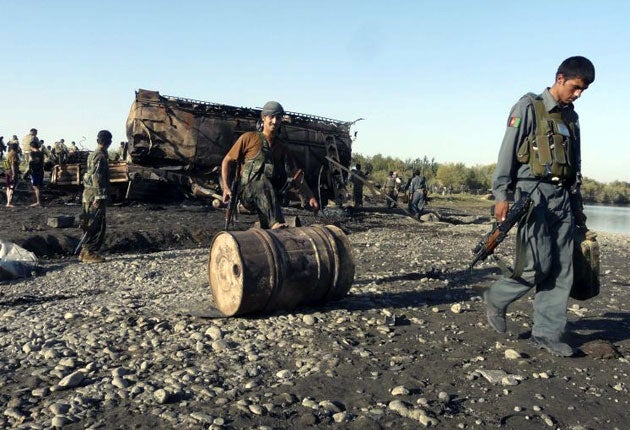Merkel under fire as general resigns over Kunduz massacre
Commanding officer and ex-defence minister stand down as video reveals Germany covered up civilian deaths

Your support helps us to tell the story
From reproductive rights to climate change to Big Tech, The Independent is on the ground when the story is developing. Whether it's investigating the financials of Elon Musk's pro-Trump PAC or producing our latest documentary, 'The A Word', which shines a light on the American women fighting for reproductive rights, we know how important it is to parse out the facts from the messaging.
At such a critical moment in US history, we need reporters on the ground. Your donation allows us to keep sending journalists to speak to both sides of the story.
The Independent is trusted by Americans across the entire political spectrum. And unlike many other quality news outlets, we choose not to lock Americans out of our reporting and analysis with paywalls. We believe quality journalism should be available to everyone, paid for by those who can afford it.
Your support makes all the difference.The head of Germany's armed forces has resigned over allegations of a military cover-up following a Nato air strike in Afghanistan that killed dozens of civilians. General Wolfgang Schneiderhan's resignation caps a deeply embarrassing episode for Chancellor Angela Merkel and her government over the country's policy in Afghanistan.
The 4 September bombing of two oil tankers in the northern Afghan town of Kunduz caused carnage, and was the deadliest incident involving German troops since the Second World War. At first the German Nato forces, which had ordered the attack, claimed that all those killed in the incident were insurgents, although later the government in Berlin expressed regrets if innocent people had been among the victims.
Yesterday General Schneiderhan, the highest ranking official in the Germany armed forces, asked to be relieved of his duties for failing to pass on crucial information to ministers. Peter Wichert, a deputy defence minister who was in office at the time of the attack also stepped down. The resignations came after Bild newspaper published photographs from a secret army video indicating that civilian deaths were known about even as the then defence minister, Franz Josef Jung, was insisting that there was no evidence to show anyone but Taliban fighters had died.
Karl-Theodor Zu Guttenberg, the current German Defence Minister, maintained that his predecessor, who is now the Labour Minister, had not seen the video at the time of his statement and that he himself had only caught sight of the images on Wednesday. But Germany's opposition parties are now calling for a parliamentary inquiry and are demanding Mr Jung's resignation. Germany's parliament is currently debating whether to extend its deployment of troops in Afghanistan amid rising domestic opposition. Barack Obama is expected to announce next week that the US will send 34,000 reinforcements to the country and also request up to 10,000 extra troops from other Nato countries. Germany, which has around 4,200 troops in northern Afghanistan, has agreed to send another 120 service personnel. However, the country's forces are currently disengaging from peacekeeping duties in Kosovo, and should, according to Western diplomatic sources, be in a position to send more to help the Afghan mission.
The order to carry out the air strike in Kunduz appeared to contravene directives from General Stanley McChrystal, the US commander of Nato forces in Afghanistan, that they should be called in only if allied forces were in immediate danger and there were no risk of civilian casualties. The order followed a number of "collateral damage" incidents involving Nato troops that caused widespread anger among Afghans.
It is still unclear exactly how many civilians died in the Kunduz strike, which followed the hijacking by Taliban insurgents of two oil trucks that subsequently became stranded in a river. People gathered at the scene to collect fuel and many died when the area was bombed. Following the bombing, which was carried out by a US F-15 fighter, General McChrystal traveled to Kunduz from Kabul to examine the scene and demanded to know why German troops had not secured the area sooner to ascertain what exactly happened. He asked Colonel Georg Klein, the commander of the base: "Why didn't RC-North [the Nato mission in the region] come here sooner? Colonel Klein responded: "I can honestly say it was a mistake."
General McChrystal, who had promised the Afghan President, Hamid Karzai, that he would investigate the deaths, then set up an inquiry under a Canadian general whose report has been sent to the German government but has not yet been made public. Earlier this month, Mr Guttenberg said that the Nato report had found "procedural errors" but had concluded that the order to carry out the bombings was "appropriate in military terms". According to Nato sources, the report contained a number of other critical comments that he did not mention.
Join our commenting forum
Join thought-provoking conversations, follow other Independent readers and see their replies
Comments